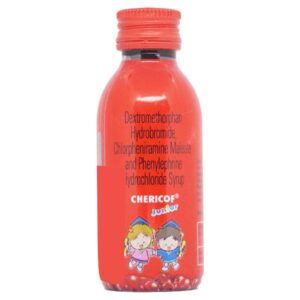DEXTROMETHORPHAN + PHENYLPROPANOLAMINE + CHLORPHENIRAMINE MALEATE
Dextromethorphan: Dextromethorphan is a medication commonly used as a cough suppressant. It is available over-the-counter and may be found in various cough and cold preparations.
Mechanism of action:
Dextromethorphan works by acting as a non-selective serotonin reuptake inhibitor (SSRI) and a NMDA receptor antagonist. It affects the signals in the brain that trigger the cough reflex. By inhibiting the reuptake of serotonin, it increases the threshold for coughing. Additionally, it also blocks the NMDA receptors, preventing the transmission of pain signals.
Use:
Dextromethorphan is mainly used to relieve cough symptoms associated with the common cold, flu, or other respiratory infections. It helps reduce the frequency and intensity of coughing, allowing for improved rest and comfort. It is important to note that it only treats the symptoms of cough and does not treat the underlying cause.
Dose:
The recommended dosage of dextromethorphan varies depending on the preparation and the age of the individual. It is always advisable to follow the instructions mentioned on the package or as directed by a healthcare provider. Doses for adults usually range from 10-30 mg every 6-8 hours, with a maximum daily dose of 120 mg. Children’s doses are typically lower and depend on their age and weight.
Side effects:
While dextromethorphan is generally considered safe when used as directed, it may cause some side effects. Common side effects may include drowsiness, dizziness, nausea, and gastrointestinal disturbances. In some cases, it may also cause confusion, hallucinations, and mood changes, especially at higher doses. It is important to be aware of the potential for abuse of dextromethorphan at high doses, which can lead to serious side effects and even addiction.
This is just a general overview of dextromethorphan. It is important to consult a healthcare professional for personalized advice and guidance regarding its use, especially if you have any pre-existing medical conditions or are taking other medications.
Phenylpropanolamine: Phenylpropanolamine (PPA) is a drug that was used as a nasal decongestant and appetite suppressant. However, it has been largely discontinued due to safety concerns.
Mechanism of action:
PPA works by constricting blood vessels, reducing nasal congestion, and relieving symptoms of a stuffy nose. As an appetite suppressant, it functions by stimulating the release of norepinephrine, a neurotransmitter that reduces hunger signals.
Use:
Previously, PPA was commonly included in over-the-counter medications for nasal congestion and weight loss. It was marketed as an appetite suppressant and was included in many diet and cold remedies. It is no longer available in most countries.
Dose:
The recommended dose of PPA for nasal congestion was typically 25-50 mg every 4-6 hours, not to exceed 150 mg in 24 hours. As an appetite suppressant, the suggested dose was 25-75 mg per dose, 3 times a day.
Side effects:
PPA was associated with a number of side effects, some of which were serious and led to its withdrawal from the market. Common side effects include increased heart rate, increased blood pressure, restlessness, nervousness, insomnia, and gastrointestinal disturbances. Rare but more serious side effects include stroke, intracranial hemorrhage, and cardiovascular events, especially when taken in high doses or in combination with other medications or substances. It should also be noted that PPA has been linked to an increased risk of hemorrhagic stroke in women.
Since PPA has largely been discontinued, it is no longer considered a safe and effective treatment for nasal congestion or weight loss. It is important to consult with a healthcare professional for alternative treatment options.
Chlorpheniramine Maleate: Chlorpheniramine Maleate is an antihistamine drug that has been used primarily for the treatment of allergies. It is available over-the-counter and in prescription strength forms.
The drug works by blocking the effects of histamine, a chemical produced by the body in response to an allergic reaction. Histamine is responsible for causing symptoms such as itching, sneezing, runny nose, and watery eyes. By blocking the effects of histamine, Chlorpheniramine Maleate helps to relieve these allergy symptoms.
Chlorpheniramine Maleate is commonly used to manage hay fever (allergic rhinitis), hives (urticaria), and other allergic reactions. It can also be used to alleviate symptoms associated with the common cold or the flu, such as sneezing and nasal congestion.
Typically, the recommended dose for adults is 4 mg every 4 to 6 hours, with a maximum daily dose of 24 mg. For children aged 6 to 12 years, the recommended dose is 2 mg every 4 to 6 hours, with a maximum daily dose of 12 mg. However, it is important to consult a healthcare professional or follow the instructions on the label for the appropriate dosage information since it may vary depending on the formulation and strength of the medication.
Common side effects of Chlorpheniramine Maleate include drowsiness, dizziness, dry mouth, blurred vision, constipation, and difficulty urinating. These side effects can be more pronounced in older adults. It is important to note that this drug can also interact with other medications, such as sedatives, tranquilizers, and antidepressants, which can lead to increased drowsiness or other adverse effects.
It is recommended to avoid alcohol consumption while taking Chlorpheniramine Maleate and to use caution when operating machinery or driving, as the drug may cause drowsiness and impair cognitive function.
As with any medication, it is crucial to follow the instructions provided by the healthcare professional or on the product label, and if any severe or persistent side effects occur, promptly seek medical advice.

